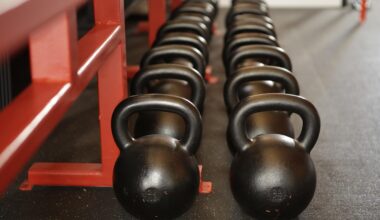Choosing the Right Multivitamin for Female Athletic Needs
For female athletes, selecting the right multivitamin plays an essential role in ensuring optimal performance and overall health. A well-rounded multivitamin can help bridge the nutritional gaps that may arise from intense training and dietary restrictions. Understanding the specific vitamin and mineral needs of females in athletics is crucial. Female athletes often have higher demands for certain nutrients, such as iron and calcium, due to factors like menstruation and bone density maintenance. This means that a multivitamin containing adequate levels of these nutrients can be beneficial. Additionally, B vitamins are important for energy metabolism and can aid in reducing fatigue. Another aspect to consider is the source of ingredients in multivitamins, as whole food-based options often provide better absorption. However, it’s important to remember that multivitamins should complement, not replace, a balanced diet filled with fruits, vegetables, whole grains, lean proteins, and healthy fats. Consulting with a registered dietitian or nutritionist can help customize vitamin choices that align with individual needs and athletic goals.
Key Nutrients for Female Athletes
When considering a multivitamin, female athletes should focus on specific key nutrients that support their unique physiological needs. The primary nutrients to look for are calcium, iron, vitamin D, and folic acid. Calcium is vital for maintaining strong bones and preventing fractures, especially in sports with a higher risk of injury. Iron supports oxygen transport in the blood, vital for endurance and performance. Vitamin D not only aids calcium absorption but also plays a crucial role in muscle function. Folic acid is essential for energy metabolism and can support recovery after strenuous training. Omega-3 fatty acids are another excellent addition, providing anti-inflammatory benefits that can promote faster recovery. Including antioxidants like vitamins C and E can help combat oxidative stress incurred during intense exercise. Remember to read the labels carefully to ensure that necessary nutrients are present in adequate amounts, while avoiding excessive dosages. Some manufacturers may also include herbal ingredients, which might offer additional benefits, although it’s vital to research these thoroughly before consumption.
Choosing a multivitamin specifically formulated for women can maximize the benefits for female athletes. Women’s multivitamins have tailored formulations that consider the nutritional needs unique to females. They generally include a balanced dose of key vitamins and minerals in proportions ideal for athletic performance and recovery. It’s equally important to evaluate the quality and credibility of the brand when making a choice. Look for brands that utilize third-party testing and provide clear information about their sourcing and manufacturing processes. This is important to ensure the multivitamin’s efficacy and safety. Some brands also provide additional certifications, such as being Non-GMO or gluten-free, which may be appealing depending on personal dietary preferences. Some female athletes may also benefit from specialized formulas that cater to their specific sport, as these may include additional nutrients tailored to support endurance or strength gains. Therefore, assessing personal health goals alongside athletic objectives is essential when selecting the right multivitamin.
Potential Side Effects of Multivitamins
While multivitamins can offer many benefits, it’s important to consider potential side effects and interactions with other supplements or medications. In some cases, excessive intake of certain vitamins and minerals can lead to toxicity. For instance, too much iron can cause stomach upset, constipation, and more severe complications. Similarly, high doses of vitamin A can be harmful and may cause nausea and dizziness. It’s crucial that female athletes stick to the recommended daily allowances for each nutrient and avoid taking multiple supplements that might overlap. Consulting with a healthcare provider before starting any new multivitamin regimen is a wise decision, especially for those with pre-existing health conditions or those taking medications. Additionally, some may experience gastrointestinal issues when first beginning a multivitamin, which usually resolves after the body adjusts. It’s critical to listen to your body and discontinue use if adverse reactions persist. Always remember that supplementation should enhance health, not replace a balanced diet.
Incorporating a well-selected multivitamin into an athlete’s diet can yield notable benefits, supporting both performance and recovery. However, it’s critical to emphasize that multivitamins are not a quick fix or substitute for poor dietary habits. Relying solely on supplements, without focusing on obtaining nutrient-rich foods, is a mistake many make. Women athletes should aim for a wide variety of family foods to provide their bodies with all necessary nutrients. This not only ensures a well-rounded intake of vitamins but also provides essential energy, fiber, and antioxidants. Prioritizing whole foods like leafy greens, berries, lean proteins, nuts, and seeds complements the supplementation to create a powerhouse diet. Staying hydrated is equally important. Adequate hydration supports optimal bodily functions, which altogether contribute to effective performance. Moreover, maintaining a healthy lifestyle with proper sleep, regular training, and stress management creates an environment that allows nutrients to work effectively. A comprehensive approach leads to enhanced athletic output, greater stamina, and improved overall health.
Consultation with Professionals
Before embarking on a new multivitamin routine, consulting a healthcare or nutrition professional is highly encouraged. This enables female athletes to understand their specific nutritional requirements based on activity levels, diet, and health history. A registered dietitian can provide personalized advice tailored to individual goals, including weight management and training focus. They can recommend specific multivitamins based on bioavailability and personal preferences. Moreover, dietitians can help identify any dietary deficiencies or excesses, allowing for informed and personalized supplementation choices. Blood tests to check for nutrient levels can guide the decision-making process and ensure that supplementation is truly necessary. Collaborating with healthcare professionals leads to informed dietary strategies that cater to athletic performance while promoting health. Nutritionists can also help design meal plans that maximize nutrient intake through whole foods. As a result, athletes can combine professional guidance with their personal experience to make choices that yield the best results for their unique needs. This effort can significantly enhance the effectiveness of any chosen multivitamin.
Lastly, it’s vital to keep in mind that the nutritional landscape for female athletes continues to evolve. Ongoing research uncovers new findings about optimal nutrition, enhancing supplement formulations that target the specific needs of female athletes. Staying informed about the latest developments in sports nutrition can better equip athletes to make knowledgeable choices about their supplements. Engaging with reputable resources, such as scientific articles and expert blogs, keeps athletes updated on any changes in recommended dietary allowances or new beneficial ingredients. Community support, like seeking advice from fellow athletes or participating in workshops, can also enhance awareness of nutritional options. By actively investing time toward understanding nutrition, athletes set themselves up for better health outcomes and athletic performance. Education empowers female athletes to make conscientious decisions that can lead to long-term benefits, including improved performance and minimized health risks. Therefore, combining knowledge, professional guidance, and ongoing education paves the way for successful supplementation that enhances athletic longevity.


